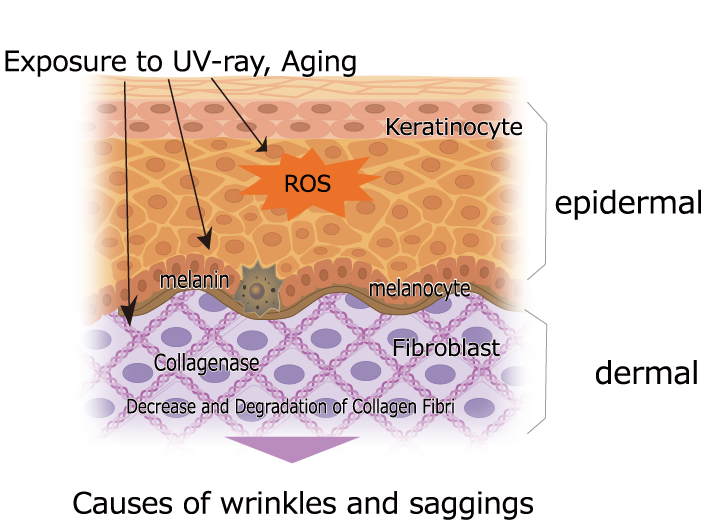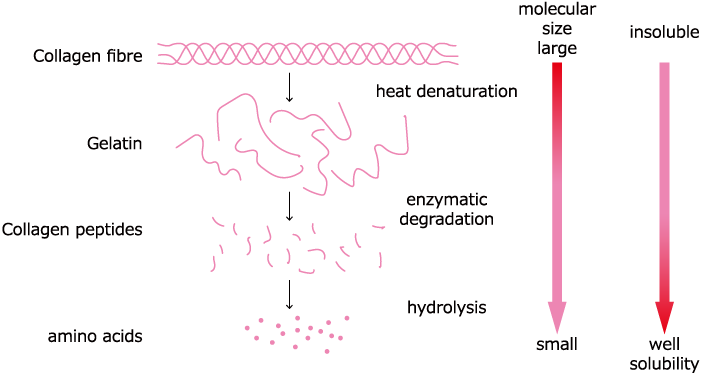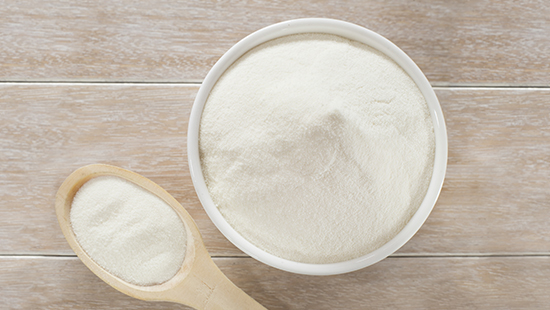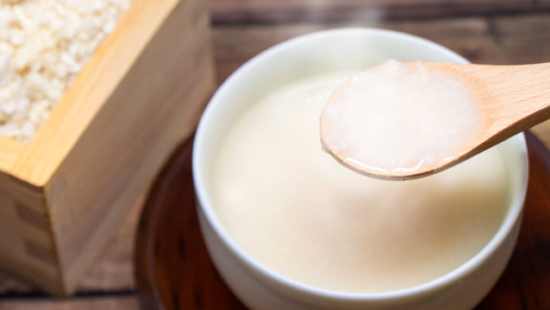1. What is collagen?
Our bodies are primarily made up of proteins, with collagen making up about 30% of that protein. Collagen is a major component of the skin, bones, cartilage, tendons and other connective tissues.
In the skin, collagen plays a particularly important role, accounting for about 70%. The skin is composed of epidermis, dermis, and subcutaneous tissue from the outside, and the epidermis is responsible for the skin's barrier function to prevent foreign objects from entering and water evaporation. The main components of the dermis are fibroblasts, collagen fibers (collagen), elastic fibers, and substrates (such as hyaluronic acid). Collagen fibers and elastic fibers give the skin its viscosity and elasticity, and hyaluronic acid, which resides in the gaps between them, retains moisture. Collagen production declines with age and collagen degradation is accelerated by UV light and other factors. The result is known to cause skin problems such as wrinkles and sagging, which in turn leads to an aging appearance.

2. What are collagen peptides?
Collagen is found in foods such as shark's fin, chicken wings, beef tendon, pork feet, and stewed burdock. This collagen is heated and broken down into gelatin, and collagen peptides are further broken down into smaller pieces using enzymes.
Collagen peptides are widely used in the food and cosmetic fields because of their low molecular weight, which makes them easily soluble in water. In food products, they are particularly advantageous from the perspective of digestion and absorption. Collagen peptides are commonly referred to as collagen in health foods. Collagen peptides currently on the market are made from cattle, pork, fish and chicken, with the majority being derived from pork.
Like other proteins, collagen peptides are digested and broken down into amino acids when ingested, but because they are rich in the characteristic amino acids glycine and proline, they are an important source of nutrients for synthesizing collagen, which is the building block of skin and joints. In addition, recent studies have shown that collagen peptides can be absorbed in the form of two to three linked amino acids and stimulate fibroblasts to induce a variety of physiological activities.

3. The effect of collagen peptides on collagen synthesis
The effects of collagen peptides on skin aging have not been studied in detail. Therefore, we tested the effects of collagen peptides in an aging rat model.
To investigate changes in skin wetness (granulation tissue) and the amount of hydroxyproline (HYP), an amino acid unique to collagen, we fed different amounts of collagen peptides to the rats.
This means that collagen peptides increased the amount of collagen in the skin.
We also tested the effects of four peptide and protein materials on the promotion of collagen synthesis. When collagen peptides, casein peptides, soy peptides, and milk proteins were fed to the rats, collagen peptides were found to promote the formation of granulation tissue, or collagen synthesis the most.
R. Itoh et. al., Japanese Journal of Food Science and Engineering., 60, 278 (2013)
These results show that taking collagen peptides increases collagen in the skin, which is deficient in aging, unlike the intake of other protein sources.
4. Differences in the absorption of collagen derived from porcine skin by molecular weight
Seven healthy men and women, aged 45-64 years, consumed beverages containing 10,000 mg of collagen peptides with an average molecular weight of 3,000 (collagen peptide-containing beverages), gelatin with an average molecular weight of 30,000, and snacks made from pig skin without hydrolyzed collagen fibers. The gelatin group and the pork skin group were taken in conjunction with a placebo drink with no collagen peptide. The gelatin and pork skin groups were consumed together with a collagen peptide-free placebo drink. Plasma hydroxyproline concentrations were measured over time after the consumption of each test food, and the maximum plasma concentration (Cmax) and area under the plasma concentration curve (AUC) were calculated.
The results showed that the plasma hydroxyproline concentration reached Cmax faster in the collagen peptide group, gelatin group, and pork skin group, in that order. The AUC of total hydroxyproline up to 60 minutes after ingestion was also significantly higher in the same order.
In summary, collagen peptides were shown to be absorbed more rapidly than gelatin and pigskin.
Y. Setoguchi et. al., Jpn Pharmacology and Therapy. 46, 267 (2018)
5. The effect of collagen peptides on the moisture content and strength of nails
Twenty healthy women aged 31 to 51 years old with nail problems such as brittle nails, easily broken nails, and two-piece nails were asked to consume a powder containing 5,000 mg of collagen peptides (collagen peptide-containing powder) for 12 consecutive weeks, and the amount of water content, hardness, sphingosine and ceramide* in their nails was measured.
The results showed that the collagen peptides group significantly increased the water content of nails compared to the placebo group without collagen peptides. In addition, nail hardness was significantly lower in the collagen peptide group than in the placebo group. In addition, the amount of sphingosine and ceramide changes in the nails was significantly increased in the collagen peptide group compared to the placebo.
These results suggested that continuous intake of 5,000 mg of collagen peptides for 12 weeks increased the levels of intercellular lipids such as sphingosine and ceramides in the nails, and that these peptides had the ability to maintain the water retention and suppleness of the nails.
* : Sphingosine and ceramide are intercellular lipid components of the stratum corneum and are important for controlling water evaporation from the stratum corneum and maintaining the normal barrier function of the skin.
S. Mori et. al., Jpn Pharmacology and Therapy. 45, 1787 (2017)
6. The effect of collagen peptides on skin moisture transpiration

Thirty healthy men and women aged 30-59 years old with dry skin problems were asked to consume a beverage containing 10,000 mg of collagen peptides (collagen peptide-containing beverages) for eight consecutive weeks, and transepidermal water transpiration was measured.
As a result, the collagen peptide group showed a significant decrease in transepidermal water transpiration compared to the collagen peptide-free placebo group.
These results suggested that continuous intake of 10,000 mg of collagen peptides for 8 weeks prevented water evaporation and kept the skin moisturized.
T. Yamamoto et. al., Jpn Pharmacology and Therapy. 46, 849 (2018)
7. effects of collagen peptides on subjective symptoms in knee joints

Twenty-six men and women aged 40 to 74 years old with subjective knee symptoms (pain, etc.) and reduced mobility were asked to consume beverages containing 10,000 mg of collagen peptides (collagen peptide-containing beverages) for 12 consecutive days, and their knee pain and quality of life (QOL) were assessed using the JKOM VAS.
As a result, the collagen peptides group showed significant improvement in JKOM's score, JKOM IV (Daily Activity)*, compared to the collagen peptide-free placebo group.
These results suggest that continuous intake of 10,000 mg of collagen peptides for 12 weeks may improve daily activities related to knee joint function and improve quality of life.
* : JKOM IV is a score that indicates whether subjective knee symptoms have restricted going out or daily activities (hobbies, habits, socializing, etc.).
T. Yamamoto et. al., Jpn Pharmacology and Treatment. 46, 837 (2018)
8. Effects of Collagen Peptides on Bone Metabolism

Twenty-one healthy men and women aged 40-79 years old and concerned about bone health consumed beverages containing 10,000 mg of collagen peptides (collagen peptide-containing beverages) for 12 consecutive weeks, and bone resorption and bone formation markers were measured and evaluated before and after consumption.
The results showed that the collagen peptides significantly changed (improved) in BAP, a bone formation marker, compared to the collagen peptide-free placebo group.
These results suggest that continuous intake of 10,000 mg of collagen peptides for 12 weeks enhances bone formation and leads to a formation-dominant bone metabolism. This indicates that 10,000 mg of collagen peptide has the ability to maintain bone health.
S. Shimotsuma, et. al.,Jpn Pharmacology and Treatment. 47, 493 (2019)















